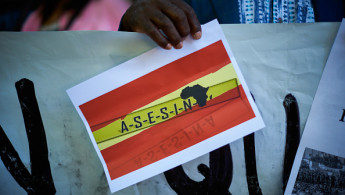Spain border police absolved of Melilla migrant deaths
Spain's public prosecutor closed an investigation Friday into the deaths of at least 23 African migrants trying to cross from Morocco into Melilla, one of its two North African enclaves.
The move eases pressure on Interior Minister Fernando Grande-Marlaska who has been under pressure for months over the tragedy which took place on June 24 when up to 2,000 migrants tried to scale the fence surrounding Melilla.
Morocco put the number of dead at 23 while Amnesty International and independent experts gave a figure of 37 in what was the worst recorded toll in years.
Melilla and its sister enclave Ceuta have long been a magnet for people fleeing violence and poverty across Africa, seeking refuge via the continent's only land borders with the European Union.
Most of those involved were Sudanese and their attempt to cross the fence sparked a two-hour confrontation. Morocco said some died after falling from the fence while others suffocated as people panicked and a stampede started.
Earlier this month, Amnesty International published a report that concluded "the methods used by Moroccan and Spanish authorities at the border contributed to the deaths of at least 37 people".
But the public prosecutor's office said investigators had found no evidence of criminal wrongdoing by Spanish security forces.
"We cannot conclude that the actions of the security forces increased the risk to the life and physical integrity of the migrants, so they cannot be charged with reckless homicide," it said in a statement.
Aligning itself with Grande-Marlaska's position, the prosecutor's office said the migrants' actions were "hostile and violent towards both the Moroccan and the Spanish security forces".
"None of them were aware of the crush that happened" at the fence "nor of its fatal consequences so at no time did they know there were people in danger who needed help", it said.
But it had passed information to the security chiefs for possible sanctions against those who threw stones at the migrants.
The Amnesty report, which was based on multiple testimonies from the scene, said migrants were hit with tear gas, pelted with stones, and beaten and kicked while on the ground.
The prosecutors' decision came just months after Spain and Morocco patched up ties following a lingering diplomatic spat.
But it also raised other worrying questions, drawing sharp criticism from one lawmaker with the Basque separatist party Bildu.
"It's a real disgrace that, in the light of the biggest ever massacre at a Spanish border, the public prosecutor's office has decided to look the other way," Jon Inarritu told Basque television.
"Investigations by the media - which have far less investigative capacity - go much further and clearly indicate that serious criminal acts occurred".
In October, UN-appointed independent experts said at least 37 people died and described the lack of accountability from both Rabat and Madrid as "alarming".
Investigations published in November by the BBC and European media consortium Lighthouse Reports denounced brutality by Moroccan forces and also questioned Spanish actions.
The prosecutor's office "has decided to turn the page and not make the government uncomfortable because it has been pushing for ties with Morocco and this could make that more difficult", Inarritu concluded.




 Follow the Middle East's top stories in English at The New Arab on Google News
Follow the Middle East's top stories in English at The New Arab on Google News


![A group of Palestinians, foreign and Israeli activists gather to participated in an olive picking event on the land in the town of Battir, which is under threat of confiscation by Israel in Bethlehem, occupied West Bank on 8 November 2024. [Getty]](/sites/default/files/styles/image_330x185/public/2182930803.jpeg?h=199d8c1f&itok=__0LgGsa)